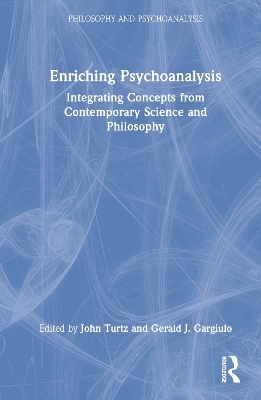
Enriching Psychoanalysis
Routledge (Verlag)
978-1-032-22193-9 (ISBN)
This compelling collection illuminates new models and metaphors taken from the contemporary sciences and philosophical thought to revitalize and recontextualize psychoanalysis for the 21st century.
The exploration of quantum mechanics, chaos and complexity theory, epigenetics, and neuropsychoanalysis provides the reader with new layers of meaning and understanding that in turn lead to an enriching of psychoanalytic theory and a deepening of experience in the consulting office. The intersection of psychoanalysis, contemporary sciences, and philosophy leads the reader to new worlds that can transform the lens from which one views the psychoanalytic process.
Written for psychoanalysts and psychotherapists, as well as scholars of psychoanalysis that are interested in the intersection of psychoanalysis, contemporary science, and philosophy, Enriching Psychoanalysis: Integrating Concepts from Contemporary Science and Philosophy expands the focus and meaning of current psychoanalytic theory and practice.
John Turtz, PhD, is faculty, supervisor, and co-director of the Psychoanalytic Program at WCSPP, as well as former director of the Couples Therapy Training Program. He is faculty, supervisor, and former co-director at the Manhattan Institute for Psychoanalysis. Dr. Turtz is faculty at the New York Medical College and is in private practice in Larchmont, New York, and Manhattan. In addition, Dr. Turtz serves on the Outreach and Advocacy Committee – a joint project of the Climate Psychiatry Alliance and the Climate Psychology Alliance – North America. Gerald J. Gargiulo, PhD, is a former president of the NPAP Training Institute, New York City, as well as the International Forum for Psychoanalytic Education (IFPE). He served as associate editor and is now on the editorial board of The Psychoanalytic Review; he also serves on the board of Psychoanalytic Psychology. He is on the faculty of the NPAP Training Institute as well as The Blanton Peale Institute (NYC). He has authored three professional texts and more than 100 articles. He received the coveted Gradiva Award (2017) for his text Quantum Psychoanalysis. He maintains a practice in Stamford, Connecticut.
Introduction, Part 1: Quantum Theory and Psychoanalysis, 1. New Models for Understanding the Clinical Unconscious: A Contribution from Quantum Findings, 2. Psychoanalysis and Physics: A Quantum Sensibility, Part 2: Nonlinear Dynamic Systems Theory and Psychoanalysis, 3. Chaos and Complexity Theory: New Metaphors and Models for Psychoanalysis, 4. Ecopsychoanalysis, Complexity and a Nonlinear Earth, Part 3: Epigenetics, 5. Psychoanalysis and Epigenetics, Part 4: Neuropsychoanalysis, 6. Neuropsychoanalysis: What, How, and Why
| Erscheinungsdatum | 17.08.2022 |
|---|---|
| Reihe/Serie | Philosophy and Psychoanalysis |
| Zusatzinfo | 2 Line drawings, black and white; 2 Illustrations, black and white |
| Verlagsort | London |
| Sprache | englisch |
| Maße | 156 x 234 mm |
| Gewicht | 353 g |
| Themenwelt | Geisteswissenschaften ► Philosophie |
| Geisteswissenschaften ► Psychologie ► Psychoanalyse / Tiefenpsychologie | |
| Mathematik / Informatik ► Mathematik ► Angewandte Mathematik | |
| Medizin / Pharmazie ► Medizinische Fachgebiete ► Psychiatrie / Psychotherapie | |
| Naturwissenschaften ► Physik / Astronomie ► Quantenphysik | |
| ISBN-10 | 1-032-22193-3 / 1032221933 |
| ISBN-13 | 978-1-032-22193-9 / 9781032221939 |
| Zustand | Neuware |
| Informationen gemäß Produktsicherheitsverordnung (GPSR) | |
| Haben Sie eine Frage zum Produkt? |
aus dem Bereich


